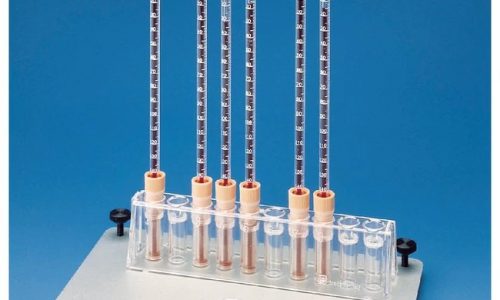Check out this interesting history on ESR: Grzybowski_Ashort_IJLH2012
In general the greater amount of protein in the blood the faster it settles and therefore has a greater ESR. Usually results greater than 60 will be confirmed with a 60 minute ESR, but lower results can be safely reported in as little as 20 minutes and multiplied by a time factor.
High ESR can be caused by:
- Inflammation – for which this test is commonly used as a screening tool
- Infection
- Rheumatoid arthritis
- Rheumatic fever
- Vascular disease
- Inflammatory bowel disease
- Heart disease
- Kidney disease
- Certain cancers (multiple myeloma)
- Females
- Pregnancy
- Old age
- hyperfibrinigenemia
- macrocytosis
Low ESR can be caused by:
- Polycythemia
- Sickle cell anemia
- Leukocytosis
- microcytosis
- hypofibrinogenemia
- hypogamaglobinemia
There are two prevailing methods. The Wintrobe method uses 100mm thin tube whereas the Westergrenn uses a 200mm thicker tube. The modified-Westergrenn uses the same thicker tube but is usually automated and abbreviated to less than 60 minutes.
Lavender top tubes are most commonly used for this methodology and when loaded the automated instrument or method will diluted the sample with sodium citrate in a 1:4 ratio (5X factor). Black top tubes are also acceptable if validated with the testing system. They are sometimes made of glass so need to be handled with extra care. They contain a pre-aliquoted amount of sodium citrate so they must be filled to the correct level and not diluted a second time by the analyzer or protocol.
Sources: https://medlineplus.gov/lab-tests/erythrocyte-sedimentation-rate-esr/ https://www.aafp.org/afp/1999/1001/p1443.html
Photo: https://www.fishersci.com/shop/products/polymedco-sediplast-autozero-esr-system-7/p-190433


Thanks a lot for the helpful post. It is also my belief that mesothelioma has an very long latency time period, which means that indication of the disease may not emerge until finally 30 to 50 years after the first exposure to mesothelioma. Pleural mesothelioma, and that is the most common kind and is affecting the area round the lungs, could potentially cause shortness of breath, torso pains, and a persistent cough, which may result in coughing up bloodstream.